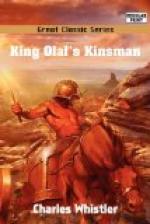“Master, I slew him myself,” he said grimly.
Then said I:
“By subtlety—after his own manner?”
“Not so, master. But even in Cnut’s own presence.”
So I was amazed, and bade him tell all.
“When I left you, master,” he said, “I took service with Jarl Thorkel. Then he went to court in London, even as I hoped, for that was all I needed, and presently came Streone with a great train to see Cnut. Now the king is not a great and strong man, as men think who have not seen him, but is tall and overgrown for his years, looking eighteen or twenty, though he is younger. He will be a powerful man some day, but his mail hangs loosely on him now. He is like an eagle in face, for his nose is high and bent, and his eyes are clear and piercing. Quiet and very pleasant is he in his way, and being so young also, some think they can do as they will with him. But that they try not twice.
“This is what Streone thought, for he deemed that he should be the king’s master if he set him on the throne. So he must needs try to gain more wealth from the king, and after he had been at court for a while, one might see that Cnut grew weary of his words. But at last there was a great feast, and I stood behind Thorkel at the high place, and Streone was next to Thorkel, and Thorkel to the king on his right hand. When the ale was going round, Streone began to find fault with some ordering of Cnut’s, and at last said:
“Maybe one might judge how things would go when the man who gave you this kingdom is treated thus.’
“Then Cnut looked at him very quietly and said:
“‘You have the same honours from me as from Ethelred.’
“‘Not so, not so,’ he said. ’I was wont to sit at the king’s right hand, with none between me and him.’
“Thereat Thorkel would have spoken, but Cnut held up his hand. I saw his bright eyes shining, and Streone should have taken warning, but his fate was on him.
“‘You think, then, that you have not all you deserve?’ the king said.
“‘I have not. You have all—owing to me.’
“Then Cnut rose up and faced him, and a great hush fell on all the assembly.
“’This earl, as it seems, will be content with nothing short of the king’s seat. Two kings has he pulled down, and one has he slain of those two. We have profited by this, as all men know. But here do I proclaim myself clear from all part in the slaying of Eadmund my brother, who, but for this man, might hereafter have taken all the kingdom when I died, according to our oaths. I suppose that no man will believe that I had nought to do with this murder, but I am clear thereof, both in thought or wish or deed.
“’Now in gaining the kingdom which has been the right of the Danish kings—if tribute paid for conquest in old time means aught—at least since the days of Guthrum, if not before, I have used the help of this earl, for Mercia was ours by right, as in the Danelagh. I will not say that his way of helping me has been what one would wish, but in war one uses what weapons one can find. For his help to me the Earl of Mercia has been well paid. Now, what shall be given to the man who betrayed to death the foster son who believed in him as in himself?’




